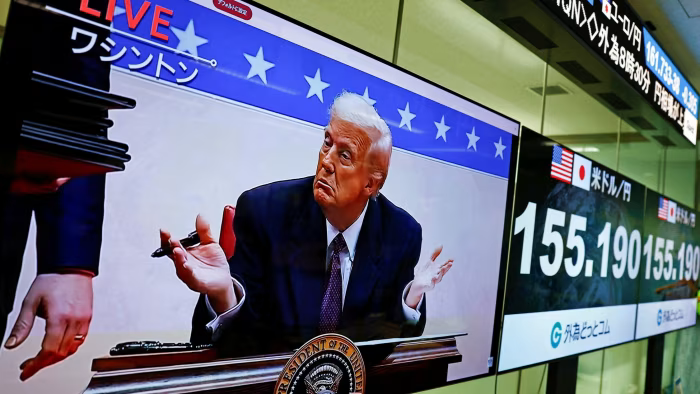
US stocks ticked higher but currencies swung a day after Donald Trump’s inauguration, as investors weighed further tariff threats from the new president against an absence of day-one actions.
The S&P 500 closed up 0.9 per cent, while the technology-heavy Nasdaq Composite gained 0.6 per cent. Both markets had been closed on Monday for a public holiday.
Speaking in the Oval Office late on Monday, Trump said he could enact tariffs of 25 per cent against Mexico and Canada as soon as February 1, repeating earlier threats to strike two of the US’s closest trading partners with levies to retaliate for weak border security and fentanyl trafficking.
Trump also unleashed a blitz of executive orders focused on issues ranging from US energy production to deregulation, echoing campaign promises.
The president’s renewed tariff warnings sent the Mexican peso falling 0.7 per cent against the dollar and the Canadian dollar down 0.1 per cent.
“It is still highly likely that considerable tariff actions are coming but in what way and exactly when remain unclear,” said Derek Halpenny, head of markets research at MUFG.
In a sign of how Trump intends to use trade curbs as a principal diplomatic tool, he also hit out at the EU, threatening the bloc with tariffs if it did not buy more US oil.
“They don’t take our cars, they don’t take our farm product, they don’t take almost anything,” said Trump on Monday. “And yet, we take their cars and we take their farm product, we take a lot from them. So we’ll figure that out with either tariffs or they have to buy our oil.”
The dollar was down 1.3 per cent against a basket of currencies as investors responded to the absence of “day one” tariffs from a flurry of executive orders.
The currency swings highlight how investors are preparing for upheaval this week, especially in currency markets, as Trump rolls out plans to unwind many of Joe Biden’s hallmark policies and enact a protectionist agenda that weaponises America’s economic heft.
“This sort of volatility is the new normal,” said Eric Winograd, an economist at AllianceBernstein. “Policy under the Trump administration is likely to be less predictable and less process oriented than what we have become accustomed to under the Biden administration.”
Elsewhere in stock markets, the FTSE 100 closed up 0.3 per cent, while Germany’s Dax was up 0.3 per cent. The broad-based Europe Stoxx 600 rose 0.4 per cent.
Wind companies fell after the Trump administration said it would halt permitting and leasing of new wind projects. Ørsted, the world’s largest offshore wind developer, which also announced fresh writedowns on its US business, tumbled 10.7 per cent. Danish turbine makers Vestas fell 2.3 per cent, while German group Nordex was down 1.8 per cent.
Bitcoin, which briefly hit a new intraday high of $109,241 on inauguration day, subsequently reversed gains as the president made no mention of cryptocurrency policy in his inaugural address. The coin’s price edged up 3.6 per cent to $106,264 on Tuesday.
Reporting by Adam Samson and Harriet Clarfelt in New York, Aime Williams in Washington, Arjun Neil Alim in Hong Kong, Leo Lewis in Tokyo, Nic Fildes in Sydney and Mari Novik and Ian Smith in London


